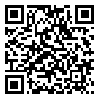Volume 13, Issue 3 (Summer-In Press 2025)
Iran J Health Sci 2025, 13(3): 183-190 |
Back to browse issues page
Ethics code: XU REC Package No. NSG-2024001292
Clinical trials code: N/A
Download citation:
BibTeX | RIS | EndNote | Medlars | ProCite | Reference Manager | RefWorks
Send citation to:



BibTeX | RIS | EndNote | Medlars | ProCite | Reference Manager | RefWorks
Send citation to:
Amante A J, Awitan C D, Baesa K L, Bangot P, Bantilan K S, Bullecer E C, et al . Stress Coping Strategies in Filipino Nursing Students: The Role of Personality Type. Iran J Health Sci 2025; 13 (3) :183-190
URL: http://jhs.mazums.ac.ir/article-1-1001-en.html
URL: http://jhs.mazums.ac.ir/article-1-1001-en.html
Alyanna Jean Amante 
 , Crystal Dawn Awitan
, Crystal Dawn Awitan 
 , Kyla Louisse Baesa
, Kyla Louisse Baesa 
 , Pamela Bangot
, Pamela Bangot 
 , Kyla Srave Bantilan
, Kyla Srave Bantilan 
 , Este Crecia Bullecer
, Este Crecia Bullecer 
 , Therese Marie Cababaros
, Therese Marie Cababaros 
 , Lucyvelle Daraman
, Lucyvelle Daraman 
 , Princess Ann Catherine Dayrit
, Princess Ann Catherine Dayrit 
 , Kenisha Xanthe Estrada
, Kenisha Xanthe Estrada 
 , Hans Quiren Leoncio Fabela
, Hans Quiren Leoncio Fabela 
 , Azurim Michaela Fosgate
, Azurim Michaela Fosgate 
 , Paolo B. Araune *
, Paolo B. Araune * 
 , Roviech John Echeveria
, Roviech John Echeveria 


 , Crystal Dawn Awitan
, Crystal Dawn Awitan 
 , Kyla Louisse Baesa
, Kyla Louisse Baesa 
 , Pamela Bangot
, Pamela Bangot 
 , Kyla Srave Bantilan
, Kyla Srave Bantilan 
 , Este Crecia Bullecer
, Este Crecia Bullecer 
 , Therese Marie Cababaros
, Therese Marie Cababaros 
 , Lucyvelle Daraman
, Lucyvelle Daraman 
 , Princess Ann Catherine Dayrit
, Princess Ann Catherine Dayrit 
 , Kenisha Xanthe Estrada
, Kenisha Xanthe Estrada 
 , Hans Quiren Leoncio Fabela
, Hans Quiren Leoncio Fabela 
 , Azurim Michaela Fosgate
, Azurim Michaela Fosgate 
 , Paolo B. Araune *
, Paolo B. Araune * 
 , Roviech John Echeveria
, Roviech John Echeveria 

Department of Mathematics, College of Arts and Sciences, Xavier University-Ateneo de Cagayan, Cagayan De Oro, Philippines. , paraune@xu.edu.ph
Abstract: (72 Views)
Background and Purpose: Nursing education with intense academic and clinical demands often leads to high levels of stress among students. To cope with stress, students use different strategies, influenced by personal factors and personality type. This study aimed to explore the use of stress coping strategies among Filipino nursing students and investigate the role of individual characteristics and personality traits.
Materials and Methods: This is a descriptive cross-sectional study. A total of 149 third-year nursing students from the College of Nursing in Cagayan de Oro City, Philippines, were selected using a stratified random sampling method. Data collection was done in March 2024 using a self-report questionnaire including a socio-demographic form (sex, birth order, family monthly income), a coping strategies inventory, and the Myers-Briggs type indicator (MBTI). Statistical analyses were conducted using independent t-tests and one-way analysis of variance.
Results: There were no statistically significant differences in coping strategies based on sex, birth order, or family income (P>0.05). However, significant differences were observed based on personality types; those with a Judging type had significantly higher mean scores in two problem-focused (Mean=3.13; P=0.001) and meaning-focused (mean=3.20, P=0.004) coping strategies compared to those with a perceiving type (Mean=2.93 and 2.96, respectively), but not in the emotion-focused coping strategies (P=0.685). The differences in problem-focused, emotion-focused, and meaning-focused coping scores between introverted and extroverted types were not significant (P>0.05).
Conclusion: Personality traits, particularly the judging versus perceiving types, significantly influence Filipino nursing students’ stress coping strategies. These findings highlight the potential benefits of incorporating personality-based approaches in designing stress management programs for nursing students.
Materials and Methods: This is a descriptive cross-sectional study. A total of 149 third-year nursing students from the College of Nursing in Cagayan de Oro City, Philippines, were selected using a stratified random sampling method. Data collection was done in March 2024 using a self-report questionnaire including a socio-demographic form (sex, birth order, family monthly income), a coping strategies inventory, and the Myers-Briggs type indicator (MBTI). Statistical analyses were conducted using independent t-tests and one-way analysis of variance.
Results: There were no statistically significant differences in coping strategies based on sex, birth order, or family income (P>0.05). However, significant differences were observed based on personality types; those with a Judging type had significantly higher mean scores in two problem-focused (Mean=3.13; P=0.001) and meaning-focused (mean=3.20, P=0.004) coping strategies compared to those with a perceiving type (Mean=2.93 and 2.96, respectively), but not in the emotion-focused coping strategies (P=0.685). The differences in problem-focused, emotion-focused, and meaning-focused coping scores between introverted and extroverted types were not significant (P>0.05).
Conclusion: Personality traits, particularly the judging versus perceiving types, significantly influence Filipino nursing students’ stress coping strategies. These findings highlight the potential benefits of incorporating personality-based approaches in designing stress management programs for nursing students.
Type of Study: Original Article |
Subject:
Health Education
Send email to the article author
| Rights and permissions | |
 |
This work is licensed under a Creative Commons Attribution-NonCommercial 4.0 International License. |






